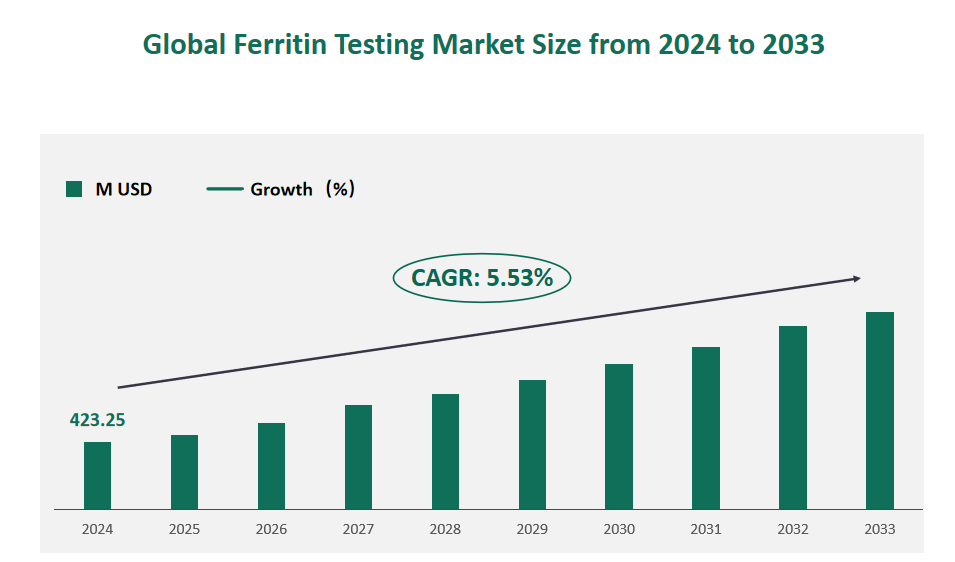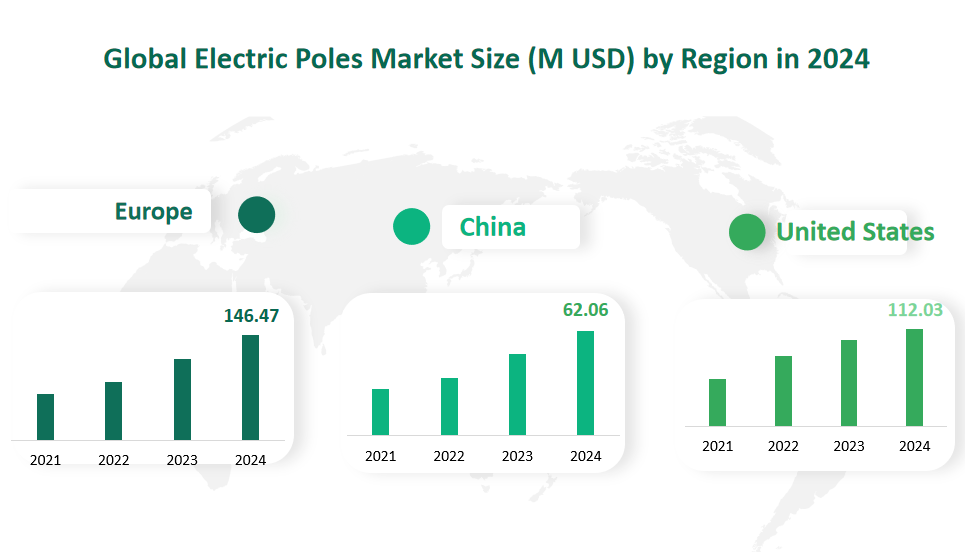1 Global Ferritin Testing Market Size (Value) and CAGR (2024-2033)
In 2024, the global Ferritin Testing market was valued at USD 423.25 million, with a CAGR of 5.53% from 2024 to 2033.
Ferritin is a protein that contains iron and serves as the primary form of iron storage within cells. The Ferritin Testing market is crucial for measuring the levels of ferritin in the blood, which reflects the total amount of stored iron in the body. This test is essential for diagnosing conditions like iron deficiency anemia and iron overload.
Figure Global Ferritin Testing Market Size (M USD) and CAGR 2024-2033

2 Ferritin Testing Market Drivers
The Ferritin Testing market has experienced significant growth in recent years, primarily driven by several key factors. One of the most prominent drivers is the increasing prevalence of blood-related diseases, particularly anemia. Anemia, characterized by a lack of healthy red blood cells, is a global health issue affecting over 30% of the world’s population. Ferritin tests are crucial for diagnosing iron deficiency anemia, making them an essential tool in healthcare settings. This growing demand for diagnostic tools to manage and treat anemia is a major contributor to the market’s expansion.
Another significant driver is the aging global population. As the number of elderly individuals increases, so does the demand for healthcare services. Older adults are more susceptible to various diseases, including those related to iron deficiency, which necessitates regular ferritin testing. This demographic trend is expected to continue, further fueling the market’s growth.
Emerging markets also play a crucial role in driving the Ferritin Testing market. Countries in Asia, Africa, and South America are experiencing rapid economic growth, leading to improvements in healthcare infrastructure and increased access to medical services. As these regions develop, the demand for advanced diagnostic tools, including ferritin tests, is expected to rise.
3 Ferritin Testing Market Restraints
Despite the positive growth trends, the Ferritin Testing market faces several challenges and restraints. One of the primary challenges is the strict regulatory environment governing medical products. The approval process for new diagnostic tests is often complex and time-consuming, requiring significant investment in research and development. This regulatory burden can delay the introduction of new products and limit market expansion.
Another significant challenge is the issue of medical resource availability, particularly in low-income and developing regions. Many areas lack the necessary infrastructure and funding to provide widespread access to ferritin testing. Limited healthcare budgets, inadequate laboratory facilities, and a shortage of trained medical professionals can hinder the adoption of these tests, especially in rural and underserved communities.
Product recalls due to quality issues also pose a threat to the market’s stability. Recalls not only damage the reputation of manufacturers but also erode consumer trust in ferritin testing products. Ensuring consistent quality and reliability is crucial for maintaining market confidence and avoiding such setbacks.
4 Global Ferritin Testing Market Size by Type in 2024
Serum samples are the most commonly used type in Ferritin Testing due to their wide application in diagnostic procedures. In 2024, the market size for Serum Sample testing is projected to be 244.61 million USD. Serum is the liquid portion of blood after clotting, which contains coagulation metabolites but not coagulation proteins. It is particularly useful for measuring ferritin levels because it provides a clear indication of the body’s iron storage status. The high demand for serum-based ferritin tests is driven by their reliability and the ease of sample collection and processing in clinical settings.
Plasma samples are another significant segment in the Ferritin Testing market. In 2024, the market size for Plasma Sample testing is estimated at 166.53 million USD. Plasma is the liquid component of blood that contains clotting factors and other proteins. It is used in ferritin testing to evaluate iron reserves in the body. Plasma samples are particularly useful for patients who require immediate diagnostic results, as they can be processed more quickly than serum samples. The market for plasma-based ferritin tests is growing due to advancements in diagnostic technologies that allow for faster and more accurate measurements.
Table Global Ferritin Testing Market Size by Type in 2024
Type | Market Size (M USD) 2024 |
Serum Sample | 244.61 |
Plasma Sample | 166.53 |
Others | 12.11 |
5 Global Ferritin Testing Market Size and Share by Application in 2024
Ferritin testing is most commonly used in diagnostic or therapeutic applications, where it helps in the assessment and management of various health conditions related to iron metabolism. In 2024, the market size for Diagnostic or Therapeutic applications is projected to be 390.98 million USD. This segment constitutes the majority of the Ferritin Testing market, accounting for approximately 92.38% of the total market share. Ferritin tests are essential in diagnosing iron deficiency anemia, iron overload disorders, and other conditions where iron levels need to be monitored. The high demand for diagnostic ferritin tests is driven by the increasing prevalence of these conditions, particularly in developing countries, and the need for accurate and timely diagnosis to improve patient outcomes.
The Research application segment includes the use of ferritin testing in scientific studies, clinical trials, and other research activities. In 2024, the market size for Research applications is estimated at 32.27 million USD, representing 7.62% of the total market share. Ferritin tests are valuable tools in research settings, where they are used to study the underlying mechanisms of iron-related disorders, develop new diagnostic methods, and evaluate the efficacy of treatments. The growth of this segment is driven by increasing investment in medical research and the need for reliable biomarkers to understand and manage iron metabolism disorders.
Table Global Ferritin Testing Market Size by Application in 2024
Application | Market Size (M USD) 2024 |
Diagnostic or Therapeutic | 390.98 |
Research | 32.27 |
6 Global Ferritin Testing Market Size by Region in 2024
The United States is a major player in the global Ferritin Testing market, with a projected market size of 112.03 million USD in 2024. This market is characterized by advanced healthcare infrastructure, high demand for diagnostic services, and a strong focus on research and development. The aging population in the United States, coupled with the increasing prevalence of chronic diseases, drives the demand for ferritin tests.
Europe is the largest regional market for Ferritin Testing, with a projected market size of $146.47 million USD in 2024. The region’s market dominance is attributed to its well-developed healthcare systems, high awareness of health issues, and a significant aging population. European countries have a strong focus on early diagnosis and treatment of iron-related disorders, which drives the demand for ferritin tests. The market in Europe is also characterized by a high adoption rate of new technologies and a strong emphasis on innovation. Continuous investment in healthcare infrastructure and the presence of major market players contribute to the region’s market growth.
China is one of the fastest-growing markets for Ferritin Testing, with a projected market size of 62.06 million USD in 2024. The country’s large population base and the increasing prevalence of iron deficiency anemia drive the demand for ferritin tests. China’s market is characterized by rapid economic growth, improving healthcare infrastructure, and rising health awareness among the population. The government’s focus on improving healthcare services and increasing access to diagnostic tools supports the market’s expansion.
Figure Global Ferritin Testing Market Size by Region in 2024

7 Major Players in Global Ferritin Testing Market
7.1 Roche
Company Profile: Roche is a multinational pharmaceutical and diagnostics company headquartered in Switzerland. Founded in 1896, Roche has a long history of innovation and excellence in the healthcare industry. The company is known for its commitment to personalized healthcare, leveraging advanced technologies to develop diagnostic tools and pharmaceuticals that improve patient outcomes.
Business Overview: Roche’s main business areas include biotechnology, diagnostics, pharmaceuticals, and personalized healthcare. The company operates globally, with a strong focus on research and development, aiming to bring innovative solutions to healthcare providers and patients. Roche’s diagnostic division is particularly renowned for its comprehensive range of diagnostic tests and systems, including those for ferritin testing.
Product Profiles: Roche offers a variety of ferritin testing products, such as the FERRITIN ELECSYS/e 411 100T, which is an immunological method for the in vitro quantitative determination of ferritin in human serum and plasma. This product is designed for use with the Elecsys 2010 and cobas e 411 systems, providing accurate and reliable results for diagnosing iron-related disorders.
Recent Financial Data: In the most recent year, Roche’s revenue in the Ferritin Testing business was 68.33 million USD.
7.2 Abbott
Company Profile: Abbott is a global healthcare company with a diverse portfolio of products and services. Established in 1888 and headquartered in the United States, Abbott focuses on pharmaceuticals, medical devices, and nutritional products. The company is known for its commitment to improving health outcomes through innovative solutions.
Business Overview: Abbott’s main business areas include Nutrition, Diagnostics, Medical Devices, and Branded Generic Pharmaceuticals. The company operates in over 150 countries, providing a wide range of products and services to healthcare providers and patients. Abbott’s diagnostic division is particularly strong, offering a comprehensive range of diagnostic tests and systems, including those for ferritin testing.
Product Profiles: Abbott’s ferritin testing products include the Multigent Reagent Architect™ Nutritional Assessment / Anemia Assay Ferritin, designed for use with the Architect c16000, C4000, C4100, C8000, Ci16200, and Ci8200 analyzers. This product provides accurate and reliable results for the quantitative determination of ferritin in human serum and plasma, aiding in the diagnosis of iron deficiency anemia and other iron-related disorders.
Recent Financial Data: In the most recent year, Abbott’s revenue in the Ferritin Testing business was 62.18 million USD.
7.3 Siemens
Company Profile: Siemens is a global powerhouse focusing on electrification, automation, and digitalization. Established in 1874 and headquartered in Germany, Siemens is also a leading supplier of systems for power generation and transmission, as well as medical diagnosis. The company operates in over 190 countries, providing a wide range of products and services to various industries.
Business Overview: Siemens’ main business areas include Electrification, Automation, Digitalization, Innovation, Solutions, Technology, Engineering, and Manufacturing. The company’s healthcare division, Siemens Healthineers, is particularly renowned for its advanced diagnostic systems and medical technologies. Siemens Healthineers offers a comprehensive range of diagnostic tests and systems, including those for ferritin testing.
Product Profiles: Siemens’ ferritin testing products include the Atellica IM Ferritin assay, designed for in vitro diagnostic use in the quantitative determination of ferritin in human serum and plasma. This product is used to aid in the diagnosis of iron deficiency anemia and iron overload, providing accurate and reliable results.
Recent Financial Data: In the most recent year, Siemens’ revenue in the Ferritin Testing business was 50.08 million USD.

